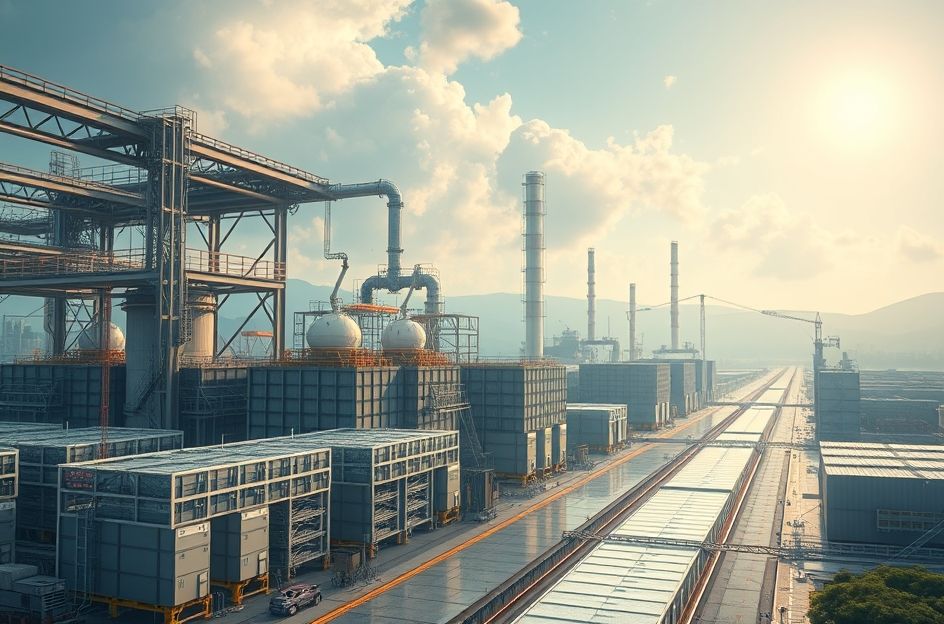South Korean battery giant LG Energy Solution is actively considering additional battery manufacturing facilities in North America as the electric vehicle market experiences unprecedented growth, company sources announced on September 11, 2025. This strategic move aims to capitalize on the U.S. Inflation Reduction Act (IRA) benefits while meeting surging demand from American automakers.
For American readers unfamiliar with LG Energy Solution, the company is one of the world's largest EV battery manufacturers, comparable to Tesla's former battery partner Panasonic, and currently supplies batteries to General Motors, Ford, and Stellantis. The Korean firm already operates two major facilities in the U.S. – one in Holland, Michigan, and another in Ohio – but growing demand necessitates significant capacity expansion.
According to industry sources, LG Energy Solution is evaluating potential sites in Texas and Georgia for new production facilities with annual capacity ranging from 30-50 GWh. The total investment is estimated at approximately $5 billion, representing one of the largest foreign direct investments in the American battery manufacturing sector since the IRA's implementation.
IRA Creates Game-Changing Market Dynamics
The Inflation Reduction Act has fundamentally transformed the North American EV battery landscape since its enactment. Under the legislation, electric vehicles equipped with North American-manufactured batteries qualify for up to $7,500 in federal tax credits – a significant incentive that has dramatically shifted automaker sourcing strategies away from Asian suppliers toward domestic production.
This policy shift mirrors historical American industrial policy, similar to how the Buy American Act influenced defense procurement or how CHIPS Act incentives are reshaping semiconductor manufacturing. For American consumers, this means potentially lower EV prices and reduced dependence on foreign supply chains, addressing both economic and national security concerns.
"We're receiving battery supply requests exceeding 400 GWh cumulatively from 2025 to 2030 from major automakers including GM, Ford, and Stellantis," explained a senior LG Energy Solution executive. "Our current production capacity simply cannot meet this exponential demand growth." To put this in perspective, 400 GWh could power approximately 5 million mid-size electric vehicles – equivalent to replacing every vehicle sold in states like California and Texas combined.
Intensifying Global Competition in American Market
LG Energy Solution faces mounting competition from Chinese battery giants CATL and BYD, as well as Japanese competitor Panasonic, all aggressively pursuing North American market share. CATL has confirmed a 35 GWh facility in Michigan through a partnership with Ford, while Panasonic announced a second Kansas facility, creating what analysts describe as a "battery arms race" on American soil.
This competitive landscape resembles the solar panel manufacturing boom of the 2010s, when Chinese companies like Suntech and American firms like First Solar competed for dominance through massive capacity investments. However, unlike solar panels, EV batteries represent a more strategic industry due to their integration with national transportation infrastructure and energy security.
The Korean company's expansion strategy focuses on advanced NCM (nickel-cobalt-manganese) batteries and LFP (lithium iron phosphate) batteries, technologies that offer different advantages for American consumers. NCM batteries provide longer driving ranges preferred by American consumers accustomed to interstate travel, while LFP batteries offer lower costs and enhanced safety – particularly important for commercial fleets and urban delivery services.
Financial Implications and Market Projections
Securities analysts project LG Energy Solution's North American expansion will contribute significantly to revenue beginning in the second half of 2025. NH Investment Securities analyst Kim Dong-hyun forecasts the company's 2025 revenue will increase over 35% year-over-year due to IRA effects and EV adoption acceleration, with North American operations accounting for more than 40% of total sales.
For American investors, this represents a substantial foreign investment in domestic manufacturing capability, potentially creating thousands of high-paying jobs in advanced manufacturing. The $5 billion investment compares favorably to major domestic infrastructure projects and could position affected regions as centers of the emerging EV ecosystem, similar to how Detroit became synonymous with traditional automotive manufacturing.
Beyond manufacturing expansion, LG Energy Solution is simultaneously diversifying its raw material supply chains to reduce dependency on Chinese mineral processing. The company is establishing long-term lithium and nickel supply agreements with resource-rich countries including Australia and Canada, while investing heavily in battery recycling technologies to create circular supply chains within North America.
This vertical integration strategy addresses American concerns about critical mineral dependencies, particularly given ongoing U.S.-China trade tensions. By developing North American battery recycling capabilities, LG Energy Solution could help establish domestic sources for lithium, cobalt, and nickel – reducing reliance on geopolitically sensitive supply chains while supporting American resource security objectives.
Strategic Implications for American EV Market
LG Energy Solution's expansion decision represents a pivotal moment in the global electric vehicle market's evolution. As traditional American automakers like Ford and GM accelerate their electric vehicle transitions, secure battery supply chains become essential for maintaining competitive pricing and meeting ambitious electrification targets.
The timing is particularly significant as Tesla, which previously dominated American EV sales, faces increasing competition from legacy automakers offering more diverse vehicle options at various price points. LG Energy Solution's expanded capacity could enable Detroit automakers to compete more effectively on pricing while offering American consumers greater choice in electric vehicle options.
Furthermore, the investment signals broader confidence in American clean energy policies and market stability, potentially encouraging additional foreign investment in domestic battery manufacturing and related industries. This creates positive economic spillover effects, including opportunities for American suppliers of battery manufacturing equipment, raw materials processing, and logistics services.
As the American electric vehicle market approaches mainstream adoption – with EV sales projected to exceed 30% market share by 2030 – secure, cost-effective battery supply chains become critical infrastructure comparable to traditional energy systems. LG Energy Solution's expansion helps ensure American consumers will have access to affordable electric vehicles while supporting domestic manufacturing competitiveness in this strategic industry.

Original Korean article: https://trendy.storydot.kr/economy-lg-battery-expansion-sep11/


0 Comments